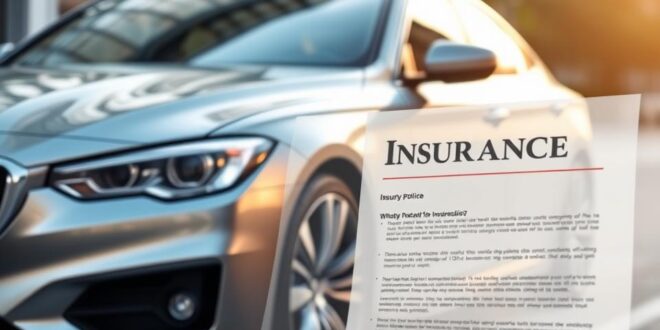Table of Contents
Knowing about car insurance is key for every driver. It’s not just about following the law. It’s also about keeping yourself and others safe on the road.
In this guide, we’ll cover the basics of auto insurance. We’ll talk about what it covers and how to pick the right policy. This article is for new drivers or anyone who wants to learn more about automobile insurance.
Key Takeaways
- Understanding the basics of car insurance
- Why auto insurance is essential
- How to choose the right insurance policy
- Factors that affect your insurance premiums
- Tips for saving on auto insurance
Understanding the Basics of Automobile Insurance
Every driver needs to know the basics of automobile insurance. It’s not just a law in most states. It also protects you financially from accidents and legal issues while driving.
What Is Automobile Insurance and Why It’s Mandatory
Automobile insurance covers losses from accidents or vehicle damage. It’s required to help drivers pay for accident costs. This protects drivers and others on the road.
Mandatory insurance laws differ by state. But, they all aim to make sure drivers can pay for accident damages. At least, drivers must have liability insurance. This covers damages to others if the driver is at fault.
Key Terms Every Driver Should Know
Knowing key terms is important for understanding automobile insurance. Some key terms include:
- Premium: The cost of an insurance policy.
- Deductible: The amount you pay before insurance covers you.
- Claim: A request for payment from the insurance company after a covered loss.
Knowing these driver terms helps you make better choices when picking a policy. It also helps during the claims process.
Types of Automobile Insurance Coverage
It’s important to know about the different types of car insurance. Car insurance is not just a must-have in most states. It’s also a key way to protect your money and things in case of an accident or damage to your car.
Liability Coverage: Protecting Others
Liability coverage is a key part of car insurance. It helps keep you safe financially if you cause an accident that hurts others or damages their stuff. It has two main parts: bodily injury liability and property damage liability.
- Bodily injury liability pays for medical bills, lost wages, and more for people hurt in an accident.
- Property damage liability covers the cost to fix or replace damaged things, like another car or a building.
Collision and Comprehensive Coverage: Protecting Your Vehicle
Collision and comprehensive coverage help keep your car safe from different kinds of damage.
Collision coverage helps fix your car if you’re in an accident, no matter who’s to blame.
Comprehensive coverage covers damage not from accidents, like theft, vandalism, or hitting an animal.
Personal Injury Protection and Medical Payments
Personal Injury Protection (PIP) and Medical Payments coverage help pay for medical bills for you and your passengers, no matter who’s at fault.
- PIP also covers lost wages and other costs you can’t do yourself anymore.
- Medical Payments coverage is more basic, just for medical bills.
Uninsured/Underinsured Motorist Coverage
Uninsured/underinsured motorist coverage helps if you’re hit by someone without insurance or not enough insurance.
This coverage is very important because many drivers don’t have enough or any insurance.
How Insurance Premiums Are Calculated
Insurance companies look at many factors to set your rates. Knowing these can help you save money on car insurance.
Personal Factors That Affect Your Rates
Your age, driving history, and marital status matter a lot. Young drivers pay more because they have less experience. But, a clean driving record can lower your rates a lot. As State Farm says, “a good driving record is one of the most effective ways to lower your insurance premiums.”
Vehicle-Related Factors
The car you drive also plays a big part. Things like the car’s make, model, age, and safety features are looked at. Cars with safety features like lane departure warning systems might cost less to insure. Also, cars that are pricey to fix or are often stolen can raise your rates.
Location and Usage Considerations
Where you live and how you use your car can change your rates. Cities usually have higher rates because of more traffic and crime. If you use your car for work or have a long commute, you might pay more.
Credit Score Impact on Insurance Costs
Your credit score can also affect your rates. Insurers see people with good credit as less risky. A study by Experian found that drivers with good credit scores file fewer claims, leading to lower premiums. So, keeping a good credit score can help lower your insurance costs.
Understanding how rates are set can help you manage your costs. As
“Insurance is a key part of being a responsible car owner,”
notes
Comparing and Choosing the Right Automobile Insurance
It’s important to compare automobile insurance policies to find the right one. There are many options out there. You need to look at different things to make a good choice.
Evaluating Coverage vs. Cost
When you compare insurance, think about both coverage and cost. Just because a policy costs more doesn’t mean it’s better. Also, the cheapest policy might not protect you enough. Think about what coverage you need and what you can live without.
- Liability coverage
- Collision and comprehensive coverage
- Personal injury protection
Researching Insurance Company Reputation
The reputation of an insurance company matters a lot. Look for companies with happy customers and quick claims service. Read online reviews and check ratings from independent agencies to see how a company is viewed.

Using Online Comparison Tools Effectively
Online tools can help you compare insurance quotes easily. These tools let you see different quotes together. Make sure you’re comparing the same things when using these tools.
Questions to Ask Before Purchasing a Policy
Before you buy a policy, ask the company about discounts, claims, and customer service. Knowing these things can help you choose wisely and might save you money.
- What discounts are available?
- How do I file a claim?
- What is the quality of customer service?
Smart Ways to Save on Automobile Insurance
Drivers can cut down their car insurance costs with smart moves. Knowing about discounts, adjusting coverage, and using tech can save a lot.
Discounts You Might Qualify For
Many insurers offer discounts to lower your premium. You might get discounts for safe driving, good grades, or safety features in your car.
- Safe driver discounts
- Student discounts
- Safety feature discounts
Bundling and Loyalty Benefits
Getting multiple policies from the same company can save a lot. Long-term customers also get loyalty discounts.
| Insurance Company | Bundling Discount | Loyalty Discount |
|---|---|---|
| Company A | 10% | 5% after 3 years |
| Company B | 15% | 10% after 5 years |
When to Consider Adjusting Your Coverage
Your insurance should change with your life. Dropping extra coverage or raising deductibles can save money.
Consider adjusting your coverage if: your car’s value drops, you drive less, or you want to cut costs.
Technology and Apps That Can Lower Your Premiums
Telematics devices or apps can show insurers you drive safely. This might lower your premiums.
By trying these options and adjusting your insurance, you can save on car insurance. You won’t have to give up necessary coverage.
Conclusion: Making Informed Decisions About Your Auto Insurance
Choosing the right auto insurance is key to protecting yourself and your car. Knowing the basics of auto insurance helps you pick the best coverage. This includes understanding different types of coverage and how premiums are set.
Things like your personal details, car type, where you live, and credit score affect your insurance costs. Looking at coverage options and costs, checking insurance company reputations, and using online tools can guide your choice.
This guide helps you understand auto insurance better. With this knowledge, you can confidently make smart choices. This ensures you get the right coverage without breaking the bank. Being well-informed leads to better choices in auto insurance.
FAQ
What is automobile insurance, and why is it necessary?
What factors affect my automobile insurance premiums?
What is the difference between liability coverage and collision coverage?
Can I lower my automobile insurance premiums by bundling policies?
How can I save money on my automobile insurance?
What is uninsured/underinsured motorist coverage, and do I need it?
How do I choose the right automobile insurance policy for my needs?




